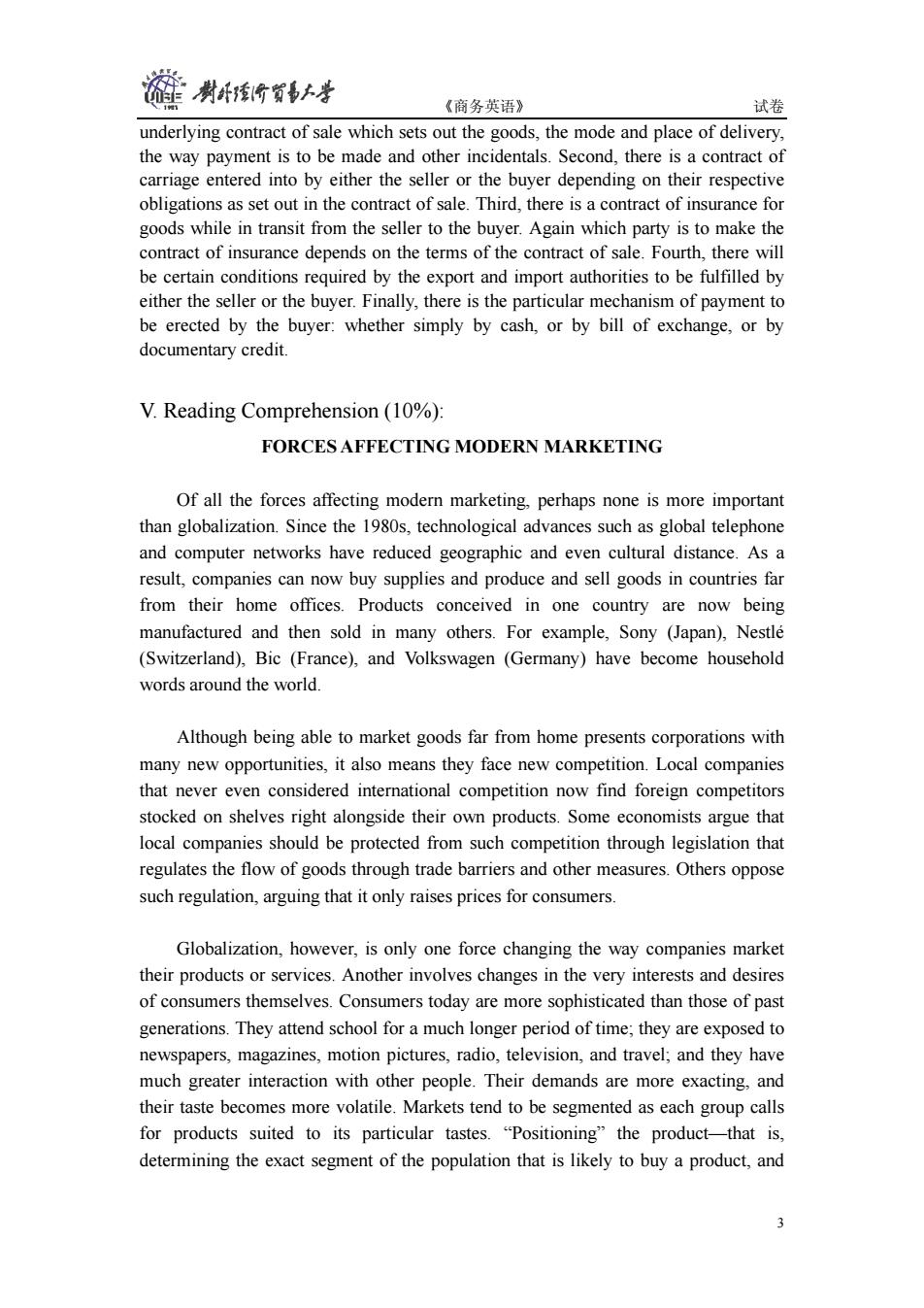正在加载图片...

旌黄有手 《商务英语》 试卷 underlying contract of sale which sets out the goods,the mode and place of delivery, the way payment is to be made and other incidentals.Second,there is a contract of carriage entered into by either the seller or the buyer depending on their respective obligations as set out in the contract of sale.Third,there is a contract of insurance for goods while in transit from the seller to the buyer.Again which party is to make the contract of insurance depends on the terms of the contract of sale.Fourth,there will be certain conditions required by the export and import authorities to be fulfilled by either the seller or the buyer.Finally,there is the particular mechanism of payment to be erected by the buyer:whether simply by cash,or by bill of exchange,or by documentary credit. V.Reading Comprehension (10%): FORCES AFFECTING MODERN MARKETING Of all the forces affecting modern marketing,perhaps none is more important than globalization.Since the 1980s,technological advances such as global telephone and computer networks have reduced geographic and even cultural distance.As a result,companies can now buy supplies and produce and sell goods in countries far from their home offices.Products conceived in one country are now being manufactured and then sold in many others.For example,Sony (Japan),Nestle (Switzerland),Bic (France),and Volkswagen (Germany)have become household words around the world. Although being able to market goods far from home presents corporations with many new opportunities,it also means they face new competition.Local companies that never even considered international competition now find foreign competitors stocked on shelves right alongside their own products.Some economists argue that local companies should be protected from such competition through legislation that regulates the flow of goods through trade barriers and other measures.Others oppose such regulation,arguing that it only raises prices for consumers. Globalization,however,is only one force changing the way companies market their products or services.Another involves changes in the very interests and desires of consumers themselves.Consumers today are more sophisticated than those of past generations.They attend school for a much longer period of time;they are exposed to newspapers,magazines,motion pictures,radio,television,and travel;and they have much greater interaction with other people.Their demands are more exacting,and their taste becomes more volatile.Markets tend to be segmented as each group calls for products suited to its particular tastes."Positioning"the product-that is, determining the exact segment of the population that is likely to buy a product,and 3《商务英语》 试卷 3 underlying contract of sale which sets out the goods, the mode and place of delivery, the way payment is to be made and other incidentals. Second, there is a contract of carriage entered into by either the seller or the buyer depending on their respective obligations as set out in the contract of sale. Third, there is a contract of insurance for goods while in transit from the seller to the buyer. Again which party is to make the contract of insurance depends on the terms of the contract of sale. Fourth, there will be certain conditions required by the export and import authorities to be fulfilled by either the seller or the buyer. Finally, there is the particular mechanism of payment to be erected by the buyer: whether simply by cash, or by bill of exchange, or by documentary credit. V. Reading Comprehension (10%): FORCES AFFECTING MODERN MARKETING Of all the forces affecting modern marketing, perhaps none is more important than globalization. Since the 1980s, technological advances such as global telephone and computer networks have reduced geographic and even cultural distance. As a result, companies can now buy supplies and produce and sell goods in countries far from their home offices. Products conceived in one country are now being manufactured and then sold in many others. For example, Sony (Japan), Nestlé (Switzerland), Bic (France), and Volkswagen (Germany) have become household words around the world. Although being able to market goods far from home presents corporations with many new opportunities, it also means they face new competition. Local companies that never even considered international competition now find foreign competitors stocked on shelves right alongside their own products. Some economists argue that local companies should be protected from such competition through legislation that regulates the flow of goods through trade barriers and other measures. Others oppose such regulation, arguing that it only raises prices for consumers. Globalization, however, is only one force changing the way companies market their products or services. Another involves changes in the very interests and desires of consumers themselves. Consumers today are more sophisticated than those of past generations. They attend school for a much longer period of time; they are exposed to newspapers, magazines, motion pictures, radio, television, and travel; and they have much greater interaction with other people. Their demands are more exacting, and their taste becomes more volatile. Markets tend to be segmented as each group calls for products suited to its particular tastes. “Positioning” the product—that is, determining the exact segment of the population that is likely to buy a product, and